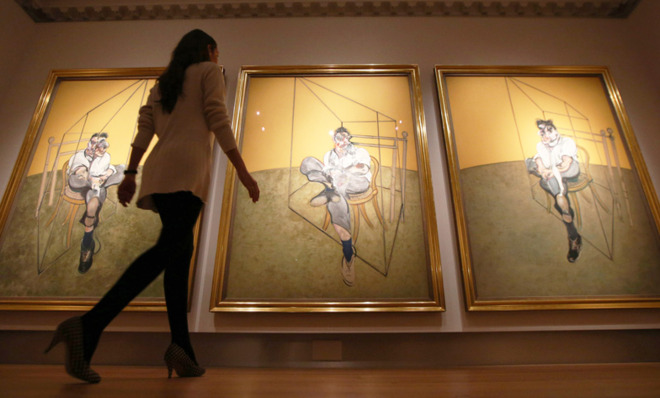What's causing the price of art to skyrocket?
It's about more than just taste and bragging rights

A free daily email with the biggest news stories of the day – and the best features from TheWeek.com
You are now subscribed
Your newsletter sign-up was successful
Last week at Christie's contemporary auction in New York, Francis Bacon's "Three Studies of Lucian Freud" sold for $142.4 million, the highest price an artwork has ever fetched at an auction.
Naturally, news of the sale prompted a rush of criticism over skyrocketing art prices. How can a commodity with a value based almost entirely on taste demand such an astronomical sum?
Many argue that the industry has evolved into the Olympics of pissing contests for the world's billionaires. As Noah Horowitz said in Newsweek in 2011, "The people who are spending record amounts on art buy more than just that glow. (And much more than the pleasure of contemplating pictures, which they could get for $20 at any museum.) They've purchased boasting rights."
The Week
Escape your echo chamber. Get the facts behind the news, plus analysis from multiple perspectives.

Sign up for The Week's Free Newsletters
From our morning news briefing to a weekly Good News Newsletter, get the best of The Week delivered directly to your inbox.
From our morning news briefing to a weekly Good News Newsletter, get the best of The Week delivered directly to your inbox.
It's a fair point, but it leaves out a well-known feature of the art world: That many sales are shrouded in secrecy. Many art transactions are unique because both the buyer and seller of a work can list themselves as a "private collection," says The New York Times. And many astronomically expensive works of art linger in storage facilities collecting value, rather than the walls of billionaire's mansions for guests to gawk over.
One reason, says The Times, may be that more of the illicitly wealthy are using the art world to launder money.
Though there are no hard statistics on the amount of laundered money invested in art, law enforcements officials and scholars agree they are seeing more of it. The Basel Institute on Governance, a nonprofit research organization in Switzerland — the site of the world’s premier contemporary and Modern art show — warned last year of the high volume of illegal and suspicious transactions involving art. But regulation has been scattershot and difficult to coordinate internationally. [The New York Times]
But art collectors don't have to break the law to jack up prices. As Allison Schrager explained in Quartz this summer, galleries keep a tight rein on prices, even in the secondary market.
Control over the market is so important to galleries that they won’t sell to collectors who will flip the art in the secondary market. Art on the secondary market is often sold at an auction house. Once an artist’s work goes to auction the prices are observable to the public, and anyone (often uttered with disdain) can buy it. It is not uncommon for gallery owners to bid on their artists work at the auction in order to control the market price. [Quartz]
Some tricks are even craftier. In USA Today, Michael Wolff explains other tricks buyers and sellers use to puff up prices:
A free daily email with the biggest news stories of the day – and the best features from TheWeek.com
A notable anomaly in the market is that old masters, with their limited supply, are now in less demand and are often priced more modestly than new artists, with unlimited supply. That defies economic logic — yet can be explained. Living artists print money. If you are a big buyer who helps set prices, you might be offered work at a goodly increase over an artist's last price point: $2 million, where the last sale was at $1 million. For that, you get one thrown in free, hence the deal has cost you nothing, but doubled the value for everybody else who holds the works, including the artist — leaving everybody happy. [USA Today]
In this way, some enormously expensive works seem less like an expression of taste or a bragging right, and more like a financial instrument — one that isn't subject to tough regulation, like most big investments. It's easy to see then why bankers are historically some of the art world's best customers.
Carmel Lobello is the business editor at TheWeek.com. Previously, she was an editor at DeathandTaxesMag.com.
-
 Will increasing tensions with Iran boil over into war?
Will increasing tensions with Iran boil over into war?Today’s Big Question President Donald Trump has recently been threatening the country
-
 Corruption: The spy sheikh and the president
Corruption: The spy sheikh and the presidentFeature Trump is at the center of another scandal
-
 Putin’s shadow war
Putin’s shadow warFeature The Kremlin is waging a campaign of sabotage and subversion against Ukraine’s allies in the West